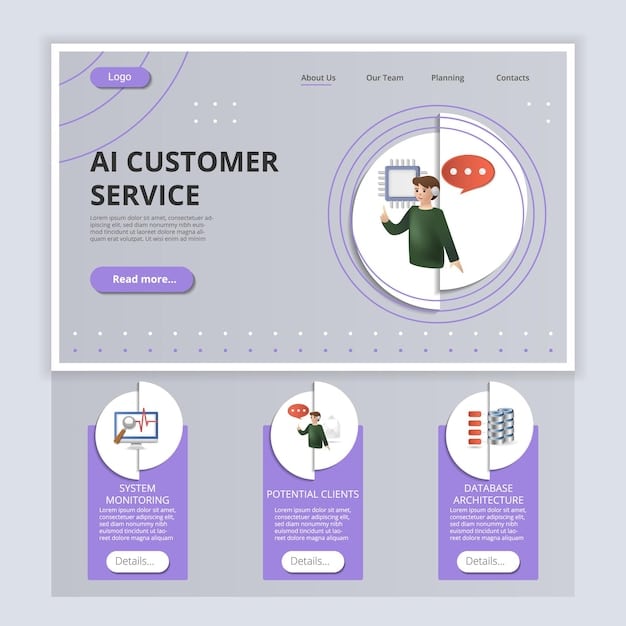AI-Powered Customer Service: US Business Guide 2025

US businesses can significantly enhance customer service in 2025 by leveraging updated AI toolsets for personalized experiences, efficient issue resolution, and proactive support, ultimately boosting customer satisfaction and loyalty.
The landscape of customer service is continuously evolving, and in 2025, how US businesses can leverage the updated AI toolset for enhanced customer service will be paramount for success. With advancements in artificial intelligence, companies have unprecedented opportunities to create more personalized, efficient, and proactive customer experiences.
Understanding the Evolving Customer Service Landscape
The expectations of customers are constantly changing, and in 2025, they will demand even more personalized and efficient service. Understanding these trends is crucial for US businesses looking to stay competitive. The integration of advanced AI tools is no longer a luxury but a necessity to meet these rising expectations.
Today’s customers expect immediate responses, personalized interactions, and seamless experiences across all channels. Businesses that fail to adapt risk losing customers to competitors who offer superior service.
Key Customer Service Trends in 2025
Several significant trends are shaping the future of customer service. These include the increasing demand for self-service options, the importance of personalized experiences, and the integration of AI to automate and enhance interactions.
- Personalization: Customers expect brands to understand their individual needs and preferences, offering tailored solutions and recommendations.
- Omnichannel Support: Seamlessly transition between different communication channels (e.g., chat, email, phone) without losing context.
- Proactive Service: Anticipate customer needs and address potential issues before they escalate.
- AI-Powered Automation: Use AI to automate routine tasks, freeing up human agents to focus on more complex issues.
To thrive in this evolving landscape, US businesses must embrace these trends and invest in the right AI tools to deliver exceptional customer service.
By understanding these trends, businesses can better prepare for the future of customer service. This preparation includes investing in the right technologies and training employees to effectively use AI-powered tools.
AI Tools Transforming Customer Interactions
The integration of AI tools is revolutionizing how US businesses interact with their customers. From chatbots to AI-powered analytics, these technologies are enhancing efficiency and personalization. Understanding the various AI tools available is crucial for businesses looking to improve their customer service in 2025.
AI tools can automate routine tasks, provide personalized support, and analyze customer data to identify trends and opportunities for improvement. By leveraging these capabilities, businesses can significantly enhance the customer experience.

Chatbots and Virtual Assistants
Chatbots and virtual assistants are among the most visible AI tools in customer service. They can handle a wide range of tasks, from answering frequently asked questions to providing basic troubleshooting.
These AI-powered assistants provide instant responses, 24/7 availability, and personalized support, improving customer satisfaction and reducing the workload on human agents.
AI-Powered Analytics
AI-powered analytics tools can analyze vast amounts of customer data to identify patterns and trends. This information can be used to improve service quality, personalize interactions, and anticipate customer needs.
By understanding customer behavior and preferences, businesses can tailor their support efforts and proactively address potential issues.
- Sentiment Analysis: Identify customer emotions and tailor interactions accordingly.
- Predictive Analytics: Anticipate customer needs and proactively offer solutions.
- Personalized Recommendations: Provide tailored product and service recommendations based on individual customer preferences.
AI tools are becoming increasingly sophisticated, offering businesses new and innovative ways to interact with their customers. By embracing these technologies, companies can create more personalized, efficient, and satisfying customer experiences.
These applications of AI not only improve customer satisfaction but also provide valuable insights that can drive business growth and innovation.
Personalizing Customer Experiences with AI
Personalization is a critical component of modern customer service. AI tools enable US businesses to deliver highly personalized experiences that cater to individual customer needs and preferences. By leveraging AI, companies can create more meaningful and engaging interactions.
Customers today expect brands to understand their unique needs and provide tailored solutions. AI can help businesses meet these expectations by analyzing customer data and delivering personalized support.
Tailoring Interactions with AI
AI can be used to tailor customer interactions in a variety of ways, from personalizing email campaigns to offering customized product recommendations.
By understanding customer preferences and behavior, businesses can create more relevant and engaging experiences that drive customer loyalty.
Benefits of Personalized Service
Personalized customer service offers numerous benefits, including increased customer satisfaction, improved customer retention, and higher sales.
When customers feel understood and valued, they are more likely to remain loyal to a brand and recommend it to others.
- Increased Customer Satisfaction: Personalized service demonstrates that the business values each customer’s unique needs.
- Improved Customer Retention: Customers are more likely to stay loyal to brands that provide personalized experiences.
- Higher Sales: Personalized recommendations and targeted offers can drive sales and increase revenue.
Personalization is not just a trend; it is a fundamental shift in how businesses interact with their customers. By embracing AI-powered personalization, US businesses can create more meaningful and rewarding customer experiences.
Ultimately, personalization is about building stronger relationships with customers and creating a competitive advantage in the marketplace.
Streamlining Operations for Efficiency
Efficiency is crucial for delivering exceptional customer service. AI tools can help US businesses streamline their operations, automate routine tasks, and optimize workflows. By improving efficiency, companies can reduce costs, improve response times, and enhance customer satisfaction.
In today’s fast-paced business environment, customers expect immediate responses and quick resolutions. AI can help businesses meet these expectations by automating tasks and optimizing processes.

Automating Routine Tasks
AI can automate a wide range of routine tasks, such as answering frequently asked questions, processing orders, and scheduling appointments. This automation frees up human agents to focus on more complex issues.
By automating routine tasks, businesses can reduce costs, improve response times, and enhance customer satisfaction.
Optimizing Workflows
AI can also be used to optimize customer service workflows. For example, AI can analyze customer data to identify bottlenecks and inefficiencies in the service process.
By optimizing workflows, businesses can improve the overall customer experience and ensure that customers receive the support they need in a timely manner.
- Improved Response Times: AI can provide instant responses to customer inquiries, reducing wait times and improving satisfaction.
- Reduced Costs: Automation can reduce the need for human agents, lowering labor costs.
- Enhanced Customer Satisfaction: Efficient service and quick resolutions lead to happier customers.
Streamlining operations is essential for delivering exceptional customer service. By leveraging AI tools, US businesses can automate tasks, optimize workflows, and improve overall efficiency.
This focus on efficiency not only benefits customers but also enhances the overall profitability and competitiveness of the business.
Overcoming Challenges in AI Implementation
While the benefits of AI in customer service are significant, US businesses may face challenges during implementation. These challenges can include data privacy concerns, the need for specialized training, and the potential for AI bias. Understanding and addressing these challenges is crucial for successful AI adoption.
It’s important to approach AI implementation strategically, taking into account potential challenges and developing plans to mitigate them.
Data Privacy Concerns
AI tools rely on vast amounts of customer data, raising concerns about data privacy and security. Businesses must ensure that they are complying with all relevant data privacy regulations and protecting customer data from unauthorized access.
Transparency and security are paramount when handling customer data. Businesses must be upfront with customers about how their data is being used and take steps to protect it from breaches.
Need for Specialized Training
Implementing AI tools requires specialized training for both employees and customers. Employees need to learn how to use AI tools effectively, while customers may need guidance on how to interact with AI-powered interfaces.
Investing in training programs can help ensure that AI tools are used effectively and that customers have a positive experience.
- Employee Training: Provide comprehensive training on how to use AI tools and integrate them into existing workflows.
- Customer Education: Offer resources and support to help customers understand how to interact with AI-powered interfaces.
- Ongoing Support: Provide ongoing support and training to address any issues or concerns that may arise.
Addressing these challenges is essential for successful AI implementation. By focusing on data privacy, specialized training, and ongoing support, US businesses can maximize the benefits of AI in customer service.
These considerations are crucial for building trust with customers and ensuring the long-term success of AI initiatives.
Preparing for the Future of AI in Customer Service
The field of AI is constantly evolving, and US businesses must stay informed about the latest developments to remain competitive. Preparing for the future of AI in customer service involves continuous learning, experimentation, and adaptation. By embracing innovation, companies can ensure that they are always delivering the best possible customer experience.
The future of customer service will be shaped by ongoing advancements in AI technology. Businesses that are proactive and adaptable will be best positioned to succeed.
Continuous Learning and Adaptation
Businesses must invest in continuous learning and adaptation to stay ahead of the curve. This includes monitoring industry trends, experimenting with new AI tools, and gathering feedback from customers.
By staying informed and adaptable, companies can ensure that they are always delivering the most effective customer service possible.
Embracing Innovation
Innovation is key to success in the rapidly evolving world of AI. Businesses should be open to experimenting with new technologies and approaches to customer service.
By embracing innovation, companies can discover new and better ways to interact with their customers and improve the overall customer experience.
- Stay Informed: Monitor industry trends and advancements in AI technology.
- Experiment: Try out new AI tools and approaches to customer service.
- Gather Feedback: Collect feedback from customers to identify areas for improvement.
Preparing for the future of AI in customer service requires a proactive and adaptable approach. By embracing continuous learning, experimentation, and innovation, US businesses can ensure that they are always delivering the best possible customer experience.
This proactive stance is essential for navigating the rapidly changing landscape of customer service and maintaining a competitive edge.
| Key Point | Brief Description |
|---|---|
| 🤖 AI-Powered Tools | Using AI chatbots and virtual assistants to enhance customer interactions. |
| 📈 Personalization | Tailoring customer experiences with personalized recommendations. |
| ⚙️ Efficiency | Streamlining operations and automating routine tasks for faster service. |
| 🛡️ Data Privacy | Addressing data privacy concerns and ensuring compliance with regulations. |
FAQ
▼
AI-powered chatbots offer instant responses to common inquiries, reducing wait times. Automation of routine tasks ensures efficient service delivery and quicker problem resolution for customers.
▼
AI enables personalized experiences through data analysis, offering tailored recommendations and support. This enhances customer satisfaction by addressing individual needs and preferences effectively.
▼
Overcome challenges with specialized training for employees and customers, transparency in data usage, and continuous monitoring. Addressing AI bias ensures equitable customer interactions.
▼
Key trends include proactive service, omnichannel support, and advanced sentiment analysis. AI anticipates needs and tailors interactions to enhance customer service experiences.
▼
Continuous learning, experimentation, and adaptation are key. Embrace innovation, monitor industry trends, and gather customer feedback. This ensures businesses deliver the best AI-driven customer experiences.
Conclusion
As we look to 2025, it’s clear that how US businesses can leverage the updated AI toolset for enhanced customer service will be a defining factor in their success. By embracing AI, companies can create more personalized, efficient, and satisfying customer experiences, ultimately driving loyalty and growth.





